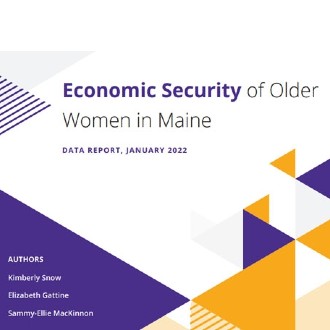
In fall 2021, the Maine Women’s Lobby and the Maine Council on Aging approached staff from the Catherine Cutler Institute to produce a snapshot of the economic security of older women in Maine that answers the question, “Can older Maine women meet their needs with the resources they have?” The resulting report, Economic Security of Older Women in Maine, was presented to members of the Maine Legislature and the press on February 28, 2022.
Kimberly Snow led a cross-program area team representing the Catherine Cutler Institute’s program areas on disability and aging and justice policy in gathering publicly available data on Maine women living in or close to poverty, wages, types of jobs, part-time work, caregiving, and rates of disability — all factors that impact the ability to accumulate wealth over time and the number of resources required to meet basic needs — compared to men. Snow, Elizabeth Gattine, and Sammy-Ellie MacKinnon found that wage disparities among full-time workers have resulted in Maine women making tens of thousands of dollars less than men. National data indicate that women earn a fraction of men’s wages even within women-dominated industries like personal care and health care support jobs. Maine women are more likely to work part-time compared to men, limiting their access to health care benefits and employer-sponsored retirement plans. Eighty-five percent of family caregivers in Maine are women, and over half of caregivers describe caregiving as causing somewhat or very much of a financial strain.
There are over twice as many women 65 and older living alone in Maine compared to men (50,000 vs. 23,400). Using data from the Elder Index, a tool developed by the Gerontology Institute at the University of Massachusetts, Boston, to estimate the annual income required to meet the needs of an older adult who lives alone for housing, food, transportation, and healthcare, the team found that at least half of older Maine women won’t have enough income to meet their basic needs. The situation for older women with long-term services and support needs is even more precarious as the Cutler Institute team noted that the Elder Index does not include these costs.
Snow and Gattine presented a sneak peek of the report to the Maine Legislative Aging Caucus on February 18, 2022, as well as at the official launch on February 28, 2022. Snow is very pleased that additional presentations to the Maine Council on Aging, the Permanent Commission on the Status of Women, and the Maine Council for Elder Abuse Prevention, plus coverage of the report in the Bangor Daily News and on MPBN, WGME, WCSH, and WABI, will bring much-needed attention to the disparities women face in the ability to meet their needs as they age.
This work was supported by a grant to the Maine Women’s Lobby Education Foundation by the Maine Health Access Foundation. The Catherine Cutler Institute’s Becky Wurwarg provided outstanding data visualization of the complex information in the report.

